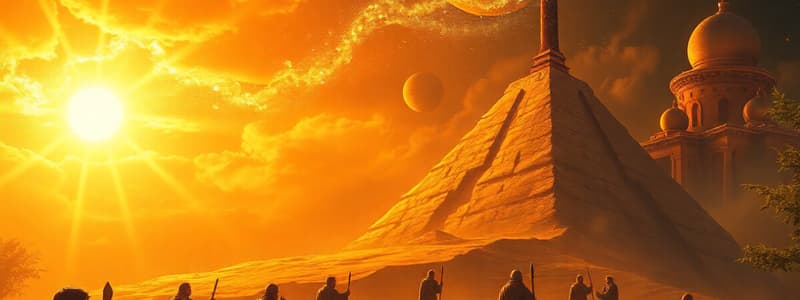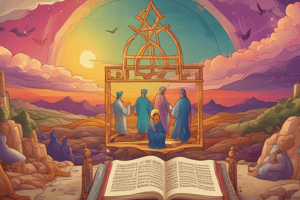Podcast
Questions and Answers
What was a major factor that contributed to the changes in religious ideas and beliefs over time?
What was a major factor that contributed to the changes in religious ideas and beliefs over time?
- The number of followers in each religion
- Interactions with other belief systems (correct)
- The physical locations of religious leaders
- The size of religious texts
What does the concept of the Covenant represent in Judaism?
What does the concept of the Covenant represent in Judaism?
- The written traditions of the Hebrews
- An agreement between people and God (correct)
- The agricultural practices of ancient Israel
- The unification of different tribes
Which of the following best describes the original social organization of the Hebrews?
Which of the following best describes the original social organization of the Hebrews?
- A centralized monarchy with rich urban cities
- A commercial society with extensive trade routes
- Nomadic pastoralists organized into tribes (correct)
- A matriarchal society governed by women
In what way did Judaism retain characteristics over time?
In what way did Judaism retain characteristics over time?
How did the small states established by the Hebrews fare in the face of external threats?
How did the small states established by the Hebrews fare in the face of external threats?
What was a significant method of preserving religious beliefs among the Hebrews?
What was a significant method of preserving religious beliefs among the Hebrews?
What does the term 'portable, congregational faiths' refer to in the context of religions?
What does the term 'portable, congregational faiths' refer to in the context of religions?
Which characteristic of religions tends to change dramatically over time?
Which characteristic of religions tends to change dramatically over time?
What was a primary way Jewish communities protected themselves during times of persecution?
What was a primary way Jewish communities protected themselves during times of persecution?
Which group played a significant role in the development of Hinduism during its early period?
Which group played a significant role in the development of Hinduism during its early period?
What was the primary teaching of Buddhism as established by Siddhartha Gautama?
What was the primary teaching of Buddhism as established by Siddhartha Gautama?
In the context of Hinduism, which texts explain the philosophy of reincarnation and liberation?
In the context of Hinduism, which texts explain the philosophy of reincarnation and liberation?
What characteristic distinguishes Buddhism from Hinduism?
What characteristic distinguishes Buddhism from Hinduism?
What was the impact of the Islamic and Catholic states on Jewish life from 1200 to 1450 CE?
What was the impact of the Islamic and Catholic states on Jewish life from 1200 to 1450 CE?
Which movement emerged as a significant form of Buddhism in China during the seventh century?
Which movement emerged as a significant form of Buddhism in China during the seventh century?
How did Hindu rulers generally respond to the diversity of beliefs in their kingdoms?
How did Hindu rulers generally respond to the diversity of beliefs in their kingdoms?
What significant belief concerning social classes was prevalent in Hinduism?
What significant belief concerning social classes was prevalent in Hinduism?
What was a common outcome for some Jews in response to external pressures during the medieval period?
What was a common outcome for some Jews in response to external pressures during the medieval period?
Which elements of Buddhism allowed it to adapt easily to new regions?
Which elements of Buddhism allowed it to adapt easily to new regions?
What was the significance of the Four Noble Truths in Buddhism?
What was the significance of the Four Noble Truths in Buddhism?
What role did the rabbi serve in Jewish communities during the diaspora?
What role did the rabbi serve in Jewish communities during the diaspora?
What was the primary purpose of Jesus' teachings?
What was the primary purpose of Jesus' teachings?
What significant event occurred in 1054 CE that impacted the Christian Church?
What significant event occurred in 1054 CE that impacted the Christian Church?
Which early church leader was instrumental in the development of Christian hierarchies?
Which early church leader was instrumental in the development of Christian hierarchies?
What is the significance of the Qur'an in Islam?
What is the significance of the Qur'an in Islam?
What led to the rise of Islam in the Arabian Peninsula?
What led to the rise of Islam in the Arabian Peninsula?
Which of the following is NOT one of the Five Pillars of Islam?
Which of the following is NOT one of the Five Pillars of Islam?
Which statement about the relationship between the Catholic Church and the Eastern Orthodox Church is accurate?
Which statement about the relationship between the Catholic Church and the Eastern Orthodox Church is accurate?
What caused the splits within Islam after Muhammad's death?
What caused the splits within Islam after Muhammad's death?
What was one way the Christian Church provided unity after the decline of the Roman Empire?
What was one way the Christian Church provided unity after the decline of the Roman Empire?
What was Muhammad's approach to religious teachings?
What was Muhammad's approach to religious teachings?
What role did the support of Roman Emperors play in the Christian Church's development?
What role did the support of Roman Emperors play in the Christian Church's development?
How did mystical movements within Islam often manifest?
How did mystical movements within Islam often manifest?
Which of the following describes the teachings of Jesus in relation to wealth and power?
Which of the following describes the teachings of Jesus in relation to wealth and power?
Flashcards
Monotheism
Monotheism
A belief system that emphasizes the existence of one God.
Covenant
Covenant
An agreement between a people and their deity, often involving promises and obligations.
Congregational Faith
Congregational Faith
A group of people who share a common belief system, often extending across vast distances.
Judaism
Judaism
Signup and view all the flashcards
Hebrews
Hebrews
Signup and view all the flashcards
Written Traditions
Written Traditions
Signup and view all the flashcards
Tribes
Tribes
Signup and view all the flashcards
Before 1450 CE
Before 1450 CE
Signup and view all the flashcards
Jesus' Preaching
Jesus' Preaching
Signup and view all the flashcards
Jesus' Kingdom
Jesus' Kingdom
Signup and view all the flashcards
Jesus as Messiah
Jesus as Messiah
Signup and view all the flashcards
Early Christian Organization
Early Christian Organization
Signup and view all the flashcards
Cultural Adaptation of Christianity
Cultural Adaptation of Christianity
Signup and view all the flashcards
Great Schism
Great Schism
Signup and view all the flashcards
Qur'an
Qur'an
Signup and view all the flashcards
Muhammad's Revelations
Muhammad's Revelations
Signup and view all the flashcards
Jihad
Jihad
Signup and view all the flashcards
Five Pillars of Islam
Five Pillars of Islam
Signup and view all the flashcards
Sunni-Shi'a Split
Sunni-Shi'a Split
Signup and view all the flashcards
Islamic Mysticism
Islamic Mysticism
Signup and view all the flashcards
Islam as a unifying force
Islam as a unifying force
Signup and view all the flashcards
Continuity and Change in Religions
Continuity and Change in Religions
Signup and view all the flashcards
History of Religion
History of Religion
Signup and view all the flashcards
Diaspora
Diaspora
Signup and view all the flashcards
Rabbi
Rabbi
Signup and view all the flashcards
Hinduism
Hinduism
Signup and view all the flashcards
Vedas
Vedas
Signup and view all the flashcards
Brahmins
Brahmins
Signup and view all the flashcards
Reincarnation
Reincarnation
Signup and view all the flashcards
Moksha
Moksha
Signup and view all the flashcards
Upanishads
Upanishads
Signup and view all the flashcards
Caste System
Caste System
Signup and view all the flashcards
Buddha
Buddha
Signup and view all the flashcards
Four Noble Truths
Four Noble Truths
Signup and view all the flashcards
Eightfold Path
Eightfold Path
Signup and view all the flashcards
Mahayana Buddhism
Mahayana Buddhism
Signup and view all the flashcards
Chan Buddhism (Zen Buddhism)
Chan Buddhism (Zen Buddhism)
Signup and view all the flashcards
Study Notes
World Religions Before 1450 CE
- Religious beliefs evolve over time due to internal factors, population shifts, and interactions with other belief systems.
- Religions, particularly widespread ones, often connect distant communities.
- Religions generally exhibit greater continuity than other human institutions.
Judaism
- Judaism's origins are in first-millennium BCE Canaan, where Hebrew traditions were written down.
- Judaism is a monotheistic faith centered around the covenant.
- Early Hebrews were nomadic pastoralists, who used shared faith for unity.
- Jews faced frequent conquests, leading to a diaspora across the Mediterranean.
- From 1200-1450 CE, Jews existed largely within Islamic and Catholic states, having dispersed communities.
- Communities lacked a centralized priesthood; rabbis led them based on regional schools and correspondence.
- Jews endured harsh treatment, often outside the social order of rulers.
- Many Jews became bankers, scribes, or assimilated; conversions to other faiths occurred.
- Jewish communities remained distinct minorities in these states.
Hinduism
- Hinduism emerged in North India between 1500 and 500 BCE.
- The Vedas serve as sacred texts, recognizing gods, goddesses, and a Brahmin priestly class.
- Brahmins presided over rituals for union with the universe's source.
- By 300 BCE, Hinduism evolved to allow individual devotion to gods, though Brahmin influence persisted.
- Upanishads introduced the idea of reincarnation and eventual liberation.
- Social class became increasingly rigid in Hinduism.
- By 1200 CE, Hinduism had spread across South Asia and Southeast Asia, incorporating local beliefs.
- Hinduism remained diverse, lacking strict centralization.
- Conflict between Hinduism and Islam intensified in northern/central India, leading to attempts at unifying Hindu thought (e.g., by Ramanuja, Chaitanya, and Madhva).
Buddhism
- Buddhism developed in North India, in the 6th Century BCE, from similar roots to Hinduism.
- It emphasizes equality over hierarchy and priestly power.
- Based on the teachings of Prince Siddhartha Gautama (Buddha).
- The Four Noble Truths (suffering, desire, limitations, and the Eightfold Path) provide a path to enlightenment through individual action.
- Buddhism emphasizes different pathways for enlightenment, including monastic life and everyday practices.
- Buddhism spread widely, adapting to different cultures.
- China became a major center by the 7th century CE, impacting Vietnam, Korea, and Japan.
- Chan/Zen Buddhism (emphasizing mediation and natural enlightenment) rose in prominence under the Song Dynasty (11th-13th centuries).
- Buddhist schools flourished and co-existed.
Christianity
- Christianity emerged in the early Roman Empire among the Jewish population.
- Based on the teachings of Jesus of Nazareth.
- Based on stories of Jesus' ministry, recorded by followers.
- Christianity emphasized a spiritual kingdom over earthly power; devotion, love, and a life following Jesus' ways.
- Jesus' followers developed differing beliefs on his role.
- Christianity became hierarchical, modeling the Roman Empire.
- Regional interpretations varied (Greek, Ethiopian, Roman).
- Roman Emperors' support led to a large, centralized church.
- Post-Roman decline, the church unified and brokered peace in Europe.
- The Great Schism (1054 CE) divided Christianity into Catholic (Rome) and Eastern Orthodox (Constantinople) churches.
- These churches both competed and collaborated, often against Muslim power.
Islam
- Islam originated with the Prophet Muhammad (c. 570–632 CE).
- Muhammad was influenced by Jewish and Christian ideas.
- Muhammad received revelations and recorded them as the Quran.
- The Quran is considered the direct words of God.
- Islam unified the Arabian Peninsula.
- Core tenets include the Five Pillars (faith, prayer, fasting, charity, pilgrimage).
- Islam spread by conquest and conversion.
- Islam experienced splits (Sunni and Shia).
- Mystical Islamic movements that blended local beliefs arose and endured.
- Islam connected and influenced diverse regions (even the Mongols and later dynasties).
Studying That Suits You
Use AI to generate personalized quizzes and flashcards to suit your learning preferences.




